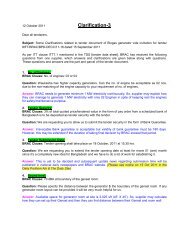Combining health and social protection measures to reach the ultra ...
Combining health and social protection measures to reach the ultra ...
Combining health and social protection measures to reach the ultra ...
- No tags were found...
Create successful ePaper yourself
Turn your PDF publications into a flip-book with our unique Google optimized e-Paper software.
Research resourcesNursing research: meeting<strong>to</strong>day’s <strong>health</strong> challenges –perspectives from <strong>the</strong>International Council of NursesArticle by Judith A Oul<strong>to</strong>n (pictured) <strong>and</strong> Patricia CaldwellToday’s <strong>health</strong> systems face an ever burgeoning numberof challenges, ranging from <strong>health</strong> care reform <strong>to</strong> <strong>the</strong>dem<strong>and</strong>s of shifting demographics; <strong>the</strong> growing burdenof chronic, noncommunicable diseases; emerging <strong>and</strong> reemerging<strong>health</strong> problems; shrinking resources; <strong>and</strong> <strong>health</strong>workforce shortages. The quest for quality <strong>and</strong> cost-effective<strong>health</strong> care has brought evidence-based practice <strong>and</strong> nursingresearch <strong>to</strong> <strong>the</strong> forefront.This article begins by briefly exploring nursing’scontribution <strong>to</strong> <strong>health</strong> research. It highlights nursing researchpriorities <strong>and</strong> concludes with an overview on streng<strong>the</strong>ningnursing’s contribution <strong>to</strong> research <strong>and</strong> offering suggestions on<strong>the</strong> way forward from an international perspective.Nursing’s contribution <strong>to</strong> <strong>health</strong> researchNursing research plays a major role in optimizing <strong>the</strong> <strong>health</strong><strong>and</strong> welfare of individuals, families, communities <strong>and</strong>populations, <strong>and</strong> in reducing inequalities in <strong>health</strong>. Nursingresearch encompasses inquiry in<strong>to</strong> all aspects, components,activities <strong>and</strong> phenomenon relating <strong>to</strong> <strong>health</strong> <strong>and</strong> of interest<strong>to</strong> nurses 1 . It covers all facets of <strong>health</strong> <strong>and</strong> disease, spanningfrom <strong>health</strong> promotion <strong>and</strong> illness prevention, <strong>to</strong> curative,rehabilitative <strong>and</strong> supportive care 2 . Nursing research examines<strong>the</strong> provision of care across all <strong>health</strong> settings includinghospitals, long-term care facilities, workplaces, schools,community <strong>health</strong> centres, clinics, rehabilitation centres <strong>and</strong>homes 3 . The knowledge generated through nursing researchprovides <strong>the</strong> scientific basis <strong>and</strong> evidence that help shapenursing practice, enhance delivery models <strong>and</strong> systems, guide<strong>health</strong> service planning <strong>and</strong> policy, inform education <strong>and</strong>,most importantly, improve patient safety <strong>and</strong> quality of care.Nurses are active in various aspects of research. They serveas principal investiga<strong>to</strong>rs, project direc<strong>to</strong>rs <strong>and</strong> co-principalinvestiga<strong>to</strong>rs. As well <strong>the</strong>y participate as advisory board <strong>and</strong>committee members on research projects <strong>and</strong> function as datacollec<strong>to</strong>rs. Nurses may work independently, <strong>to</strong>ge<strong>the</strong>r with o<strong>the</strong>rnurses or in multidisciplinary research teams alongside o<strong>the</strong>rdisciplines such as medicine <strong>and</strong> pharmacy. Increasingly,nurses are employed by <strong>the</strong> pharmaceutical industry <strong>to</strong>coordinate clinical trials evaluating new medications.Box 1 provides a number of examples illustrating <strong>the</strong> variedexpertise <strong>and</strong> contribution nurse researchers are making <strong>to</strong>nursing, <strong>health</strong> <strong>and</strong> <strong>health</strong> systems research.Indeed, <strong>the</strong> past decade has witnessed an exponentialgrowth in both <strong>the</strong> quantity <strong>and</strong> quality of nursing research.Its development has been influenced in part by <strong>the</strong>recognition of <strong>the</strong> importance of research <strong>to</strong> <strong>the</strong> profession<strong>and</strong> an expansion in <strong>the</strong> number of graduate <strong>and</strong> doc<strong>to</strong>ralprogrammes available <strong>to</strong> nurses. A rise in <strong>the</strong> number ofinstitutions funding, supporting <strong>and</strong> conducting nursingresearch has also been a good indica<strong>to</strong>r of its growth <strong>and</strong>development. Examples of such organizations include <strong>the</strong>United States National Institute of Nursing Research; <strong>the</strong>International Center for HIV/AIDS Research <strong>and</strong> ClinicalTraining in Nursing; <strong>the</strong> Research Centre for Nursing <strong>and</strong>Midwifery Practice in Australia; <strong>the</strong> Canadian Health ServicesResearch Foundation; <strong>the</strong> World Health OrganizationCollaborating Centres for Nursing Research <strong>and</strong>Development; <strong>and</strong> <strong>the</strong> Working Group of European NurseResearchers. Also noteworthy is a steady increase in <strong>the</strong>number of high-quality journals <strong>and</strong> text books devoted <strong>to</strong>nursing research <strong>and</strong> <strong>the</strong> growth in scientific events atnational, regional <strong>and</strong> international levels. In addition, morecountries have begun developing <strong>and</strong> adopting nationalresearch plans for nursing, such is <strong>the</strong> case in Irel<strong>and</strong> <strong>and</strong>Denmark 14,15 .Nursing research prioritiesThe International Council of Nurses’ (ICN) position withrespect <strong>to</strong> nursing research is embodied in <strong>the</strong> 1987statement on <strong>the</strong> organization’s role in research <strong>and</strong>considered equally relevant <strong>to</strong>day:“ICN is convinced of <strong>the</strong> importance of nursing research asa major contribution <strong>to</strong> meeting <strong>the</strong> <strong>health</strong> <strong>and</strong> welfare needsof people. The continuous <strong>and</strong> rapid scientific developmentsin a changing world highlight <strong>the</strong> need for research as ameans of identifying new knowledge, improving professionaleducation <strong>and</strong> practice, <strong>and</strong> effectively utilizing resources[….] ICN believes that nursing research should be <strong>social</strong>lyrelevant. It should look <strong>to</strong> <strong>the</strong> future while drawing on <strong>the</strong>118 ✜ Global Forum Update on Research for Health Volume 4



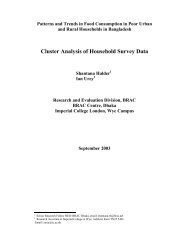
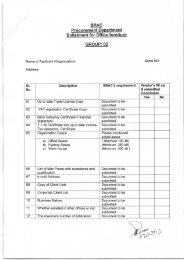
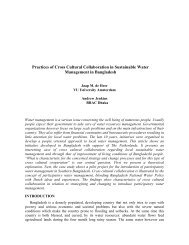

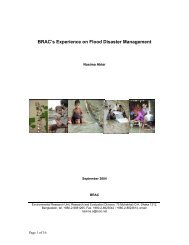
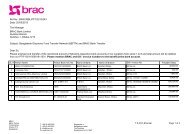
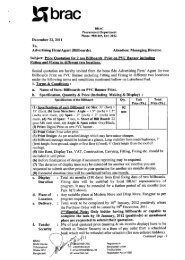
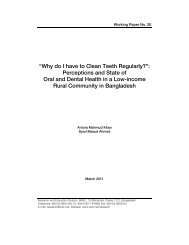
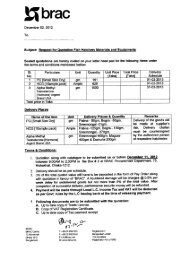

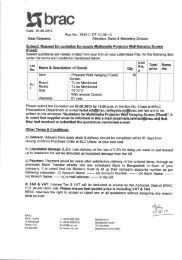
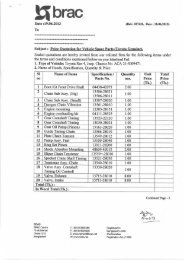
![[re-tender] RFQ for supply of Diesel Generator - Brac](https://img.yumpu.com/44421374/1/186x260/re-tender-rfq-for-supply-of-diesel-generator-brac.jpg?quality=85)
